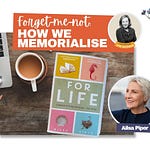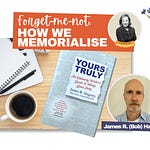Some conversations leave you changed. Today’s incredible program featured Rhonda Lauritzen of Evalogue.Life in conversation with Jane Hutcheon discussing about those moments when we’re tasked to tell a loved one’s life in a memorial or biography — in any form.
Rhonda is not only a professional biographer who has written a dozen books on family and local history, she’s also a memoir coach with an acclaimed series of courses and mentoring programs. Her most recent book, “A Child in Berlin,” is the story of Heidi Posnien’s early life in Berlin during World War II.
Our conversation touched on the many challenges that apply as readily to everyday storytelling as formal projects for a family or community. The conversation referenced tips and external resources, among them:
One of the most powerful ways to draw someone out is to be completely present during a conversation. Imagine the background fading to a blur so you can focus on the story you’re receiving.
Receiving a story can be about the sharing of compelling emotions. In discussing anguish in A Child in Berlin, Rhonda mentions the power of emotions and Brené Brown’s book, “Atlas of the Heart.”
In a discussion of process, Rhonda shares that storyboarding is a learned technique she both teaches and now relies on to find the pacing of the emotional moments in a story. Consider these moments as creating beats.
On Evalogue.Life, Rhonda shares a toolkit with templates and resources for storyboarding at Evalogue.life/storyboarding.
As the conversation turned to using themes as a way to organize a story, Rhonda quotes a reminder that if you’re too heavy-handed with a theme, you’ll find you’ve written propaganda and not a story. She went on to share the power of using a timeline to organize a tale. Vignettes, like short stories, can weave the narrative together using time as a throughline. By way of example, she shared a reference to a video inspired by her grandfather’s wallet:
Rhonda’s use of her voice to tell this story is a compelling example of the power of voice to convey emotion. She referred to the importance of capturing oral histories while you still can.
Rhonda’s well-known for her terrific oral history resources for family storytellers: Evalogue.life/oral-history
Finally, Jane and Rhonda discussed the impact of the COVID pandemic on the practice of memorials and celebrations of life.
Six months into the pandemic, Rhonda wrote a detailed article on the nuances of holding a Zoom funeral. Today, when recording these programs has become quite commonplace, the suggestions are every bit as valid: Evalogue.life/zoom-funeral
Beyond these links mentioned during the conversation, Rhonda shared an additional reference she thought might be helpful as well:
A tool kit on writing about the hard stuff: Evalogue.life/sensitive2
Rhonda’s writing partner, Rachel Trotter, added a companion article:
Evalogue.life/how-remembering-someone-who-passed-away-helps-with-grief
About this series
“Forget-Me-Not: How We Memorialise” is a six-part series for storytellers and family historians that explores how we memorialize and preserve the stories of people who have died. The series is a collaboration between Jane Hutcheon of The Juvenile Geriatric Newsletter and Projectkin.org, a community of family historians hooked on stories.
Jane Hutcheon is a Sydney-based journalist and the creator and former host of the ABCTV interview show One Plus One from 2010 until 2019. She is also a writer and performer in theater productions sharing her perspectives in on Substack. In 2022, she wrote a show about my mother’s upbringing called Lost in Shanghai, and her latest show is Difficult Conversations with Jane Hutcheon. We’re thrilled to have this Forget-Me-Not series as part of Projectkin.
More about Jane’s concept for the series, and join us at an upcoming event!
Are there topics you’d like us to cover in this series or as Projectkin? Please don’t hesitate to let us know. We’d love to hear from you and welcome member participation in our programs.















Share this post